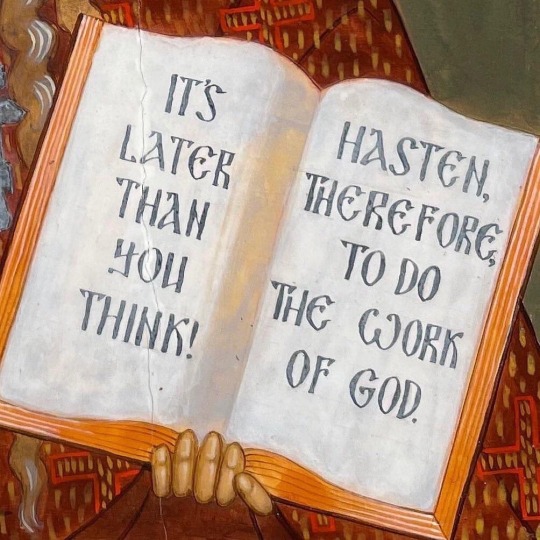Text
0 notes
Text
“The non-existence of God is for me not an obstacle but a precondition to believing in God. I am an atheist believer.”
— Klaas Hendrikse
(via virgin-martyr)
118 notes
·
View notes
Text

Christian Wiman, from "The Parable of Perfect Silence"
423 notes
·
View notes
Text
god chose the lowly things of this world and the despised things—and the things that are not—to nullify the things that are
0 notes
Quote
The mystery of the poor is this:
that they are Jesus,
and what you do for them
you do to him.
Dorothy Day (via anachronizomai)
789 notes
·
View notes
Quote
The Church has no place to flaunt flags of national preference. God’s grace and gospel are international. Christ died for all men. Antichrist means to run the church by government edict. Then we will have state and Church. The State will dictate to the Church. The flags represent fallen nations, with fallen nationalistic, sectional prides, ambitions, etc., that breed strife, enmity, jealousy, and war, for they are without Christ. We do not belong to them.
Frank Bartleman, Early Pentecostal leader (via milkboydotnet)
16 notes
·
View notes
Text
True Fasting
“Is not this the fast that I choose:
To loose the bonds of injustice,
To undo the thongs of the yoke,
To let the oppressed go free,
And to break every yoke?
Is it not to share your bread with the hungry,
And bring the homeless poor into your house;
When you see the naked, to cover them,
And not to hide yourself from your own kin?”
- Isaiah 58:6-7 NRSV
77 notes
·
View notes
Text


canticle 16 / psalm 116
for the feast of mary magdalene!
37 notes
·
View notes
Text
“Second, as Acts confirms, again inadvertently, James was the ultimate authority on matters of dotrine. “If we were to call any apostle ‘pope’ in primative [Christian] hierarchy,” as a scholar hence rightly notes, “it would be James.” Why, then, is the image of James so blurred in the book of Acts - and in fact in the whole Christian tradition?”
Mustafa Akyol | The Islamic Jesus
61 notes
·
View notes
Quote
You are not making a gift of what is yours to the poor man, but you are giving him back what is his. You have been appropriating things that are meant to be for the common use of everyone. The earth belongs to everyone, not to the rich.
St. Ambrose, Saint Ambroise et l'empire romain
(via and-also-with-yall)
#quotes#political theology#theology#quote does not belong to st. ambrose bc knowledge is given to benefit everyone not to benefit antisemites
643 notes
·
View notes
Text
Appropriating God’s praise for self affirmation
So I had a thought today:
I have a second blog focusing on mental health and recovery and stuff, and it follows a number of blogs that look to Bible quotes for comfort and inspiration. One of the things that I’ve noticed is that often these blogs will post a Bible verse where it talks about God as being great or something, calling Him “you”, which they then reframe to mean themselves or the reader.
There are a number of obvious theological issues here. Firstly, doing this takes the verse out of context, and therefor distorts the meaning. Secondly, this distortion evacuates it of its meaning as praise, which might be said to be stealing this from God or something. Thirdly and more broadly, this whole approach treats faith like a resource to be mined for self-help, without any broader theological reflection or commitments.
But equally, this sort of thing can be super helpful from a personal point of view, and I don’t want to personally condemn it. Moreover, it’s a way of engaging with the Church and its culture in the context of one’s daily life – which, prior to all questions of whether the ‘how’ of this is justified, is clearly a good thing.
Finally, it’s important to note that these reasons don’t amount to an argument that appropriating bible verses praising God to affirm yourself is unethical or unjustified on balance. I think that this is clearly a context-relative issue and I wouldn’t want to make general judgments along these lines.
But it is perhaps worth asking whether this practice can be recovered in a less theologically problematic way.
The thought I had today was this: perhaps we can look to the idea of the imago dei to recover this practice. Humans are made in the image of God, and all our goodness is manifest in (and derivative of) Him – albeit in an analogous way that is particular to God, Him being an entirely different kind of thing to creation. In this way, when we find a text describing God’s goodness, we can also read this text as analogously describing ways in which we ourselves can be good.
In this way, appropriating a text which praises God and applying it to ourselves can serve a real theological function. If our praise of ourselves is approached ironically, as ‘really’ praise of God, then we come to understand our proper relation to God in our goodness. Because we know that the text we appropriate is ‘really’ addressed to God, the text in its appropriated context requires a self-consciously ironic reading. This appropriation then serves as the basis for a spiritual practice, in which we reveal and enact our relation to God by contextualising our virtue as always appropriated from God.
This reflective element means that this practice no longer reduces theology ‘merely’ to self-help. Moreover, the self-consciously ironic dimension means that it doesn’t involve ‘straight up’ appropriation or decontextualisation, and therefore the same kind of obviously problematic hermeneutic and appropriation of praise identified above
But what about the pastoral role of the practice? If we make it about reattributing our virtue to God, then surely it evacuates it of the power to be affirming? I don’t actually think that this is the case.
Once we acknowledge that all being derives from God, then the explicit grounding of a being in God serves as an explicit affirmation of its actuality as such. In this way, if we approach our appropriated affirmation in the context of a prior affirmation of our goodness, it serves as a guarantee of the reality of that goodness. Our goodness ceases to be some subjective thing, imposed upon ourselves by a mind which (as a depressed person I might think) is just being narcissistic. The next step is to appreciate that if there is value in the world, it is derivative of these objective goods which are grounded in the divine. Thus our possession of those goods thus translates to the objectivity of our own value.
Of course, this means that this practice ceases to affirm our possession of particular goods – this must be presupposed in order for the practice to work as affirmation. But it does imply a stance in which we affirm our possession of value as an object in a non-value neutral world, as opposed to a valueless/value-neutral object in a valueless/value-neutral world. And when I’m depressed I often lose sight of the value in the world in general, and thus my own – so I think that this could be helpful, at least in some cases.
2 notes
·
View notes
Text
Something I find myself constantly worrying about is how I should approach suffering theologically in my life.
In short, certain Augustine- (or Luther-) influenced theologians say that you should embrace suffering as a direct expression of the failures of the world to provide the fulfilment that only God provides. In this context, the pleasure principle is to be distrusted insofar as it seeks to alleviate suffering, rather than pursue God. As such, where your pursuit of pleasure is ambiguously virtuous, you ought to err against the pleasure principle because it is more likely than not idolatrous.
The important insight here is that the generic suffering of unfulfilment that is essential to worldly human existence is not the same as other kinds of suffering that we endure. For example, sometimes when I am depressed I do not find joy in the sacraments. This is a clear example of where my suffering is specifically not (directly) caused by the denial of God, because it remains unalleviated even where God is being attained.
In this situation, things that alleviate this suffering are conditions for my proper appreciation of the true Good. That is, the pleasure principle actually works in favour of my attaining God, rather than idolatrously against it by attempting to replace Him.
The question is: in which situations does this hold? Moreover, if certain things are essential for our having this capacity for a proper appreciation of God, then because God is the ultimate good of humanity, these things must be held as proximate goods. In this way, the pleasure principle might be a guide to natural law. If this is the case, this also makes personal experience a source of insight into natural law, at least as it extends to our particular personal situations (obviously to be negotiated alongside other sources of insight).
4 notes
·
View notes
Photo

Thank you, Saint Sebastian, for helping us in our relationship. It’s tough because our families are against our love. Amapola Ruiz and Enriqueta Vazquez give thanks.
Mexico, 4th April, 1990
274 notes
·
View notes
Photo


“Dios es gay” UNC, Ciudad Universitaria, Casa Verde
819 notes
·
View notes
Text
I blame the Catholic Church for making people forget that Jesus had brothers and sisters.
1K notes
·
View notes

